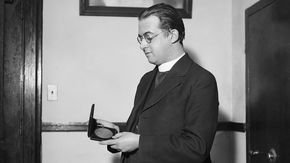Move over, Hubble: Discovery of expanding cosmos assigned to little-known Belgian astronomer-priest

Hubble’s Law, a cornerstone of cosmology that describes the expanding universe, should now be called the Hubble-Lemaître Law, following a vote by the members of the International Astronomical Union (IAU), the same organization that revoked Pluto’s status as a planet. The change is designed to redress the historical neglect of Georges Lemaître, a Belgian astronomer and priest who in 1927 discovered the expanding universe—which also suggests a big bang. Lemaître published his ideas 2 years before U.S. astronomer Edwin Hubble described his observations that galaxies farther from the Milky Way recede faster.
The final tally of the 4060 cast votes, announced today by IAU, was 78% in favor of the name change, 20% against, and 2% abstaining. But the vote was not without controversy, both in its execution and the historical facts it was based on. Helge Kragh, a historian of science at the Niels Bohr Institute in Copenhagen, calls the background notes presented to IAU members “bad history.” Others argue it is not IAU’s job to rename physical laws. “It’s bad practice to retroactively change history,” says Matthias Steinmetz of the Leibniz Institute for Astrophysics in Potsdam, Germany. “It never works.”
Piero Benvenuti of the University of Padua in Italy, who stepped down as IAU general secretary in August, proposed the change last year because, he says, “historically, it felt not right.” In 1927 Lemaître calculated a solution to Albert Einstein’s general relativity equations that indicated the universe could not be static but was instead expanding. He backed up that claim with a limited set of previously published measurements of the distances of galaxies and their velocities, calculated from their Doppler shifts. However, he published his results in French, in an obscure Belgian journal, and so they went largely unnoticed.
In 1929, Hubble published his own observations showing a linear relationship between velocity and distance for receding galaxies. It became known as Hubble’s Law. “Hubble was clearly involved, but was not the first,” says astronomer Michael Merrifield of the University of Nottingham in the United Kingdom. “He was good at selling his story.”
The text of the IAU resolution, circulated to members ahead of the vote, asserts that Hubble and Lemaître met in 1928, at an IAU general assembly in Leiden, the Netherlands—between the publication of their two papers—and “exchanged views” about the blockbuster theory. Kragh says that meeting “almost certainly didn’t take place” and that IAU’s statement “has no foundation in documented history.” Benvenuti counters that historians know from comments from Hubble’s assistant that he returned very excited from Leiden and began to gather more data. “Who else could have talked to Hubble about this problem but Lemaitre?” Benvenuti asks.
The resolution has also come under fire for confusing two different issues: the expansion of the universe and the distance-velocity relation for galaxies, which is also known as the Hubble constant. Hubble never claimed to have discovered cosmic expansion, but did do much of observing work to nail down how fast the universe was expanding . “If the law is about the empirical relationship, it should be Hubble’s Law,” Kragh says. “If it is about cosmic expansion, it should be Lemaître’s Law.”
Members have also criticized IAU over the way the vote was conducted. Traditionally, IAU resolutions are debated at general assemblies, once every 4 years, and decided by a show of hands of attending members. But such a straw poll led to the unpopular 2006 vote that reclassified Pluto as a dwarf planet. “The IAU got badly burned over the Pluto thing,” Merrifield says. As a result, IAU introduced the provision of having an online vote of the whole 11,000 membership.
In the case of Hubble’s Law, attendees at the August general assembly in Vienna were frustrated by a very short debate, followed by a straw poll (74% in favor of the name change). The IAU executive committee invited others to submit questions electronically and launched the online vote at the beginning of October. Merrifield says there was not enough time and opportunity for debate. “The IAU presented the issue as neat and tidy, but it is a much more murky and messy tale,” he says. He says several other researchers could have a claim because they were also working on cosmic expansion and galaxy motion at the time.
A final concern is whether IAU is within its rights to weigh in on historical affairs. “There is no mandate to name physical laws,” Steinmetz says. IAU has acknowledged this and is only recommending the use of the term Hubble-Lemaître Law. Will it catch on? “No, I don’t think so,” Kragh says. “Hubble Law is ingrained in the literature for most of a century.”
In any event, says Merrifield, “It doesn’t matter all that much, really.”
